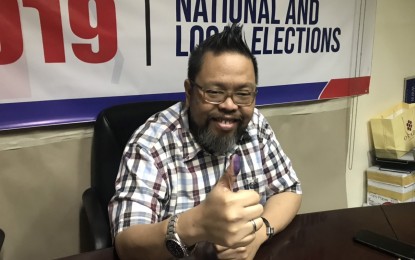
Comelec spokesperson James Jimenez. (File photo)
MANILA -- The Commission on Elections (Comelec) described 2019 as another successful election year.
According to Comelec spokesperson James Jimenez, the midterm polls conducted in May was considered as one of the most credible elections in the country's history.
“2019 was successful. Obviously, the biggest thing this 2019 was the May election. And the May elections were shown to be one of the most credible and trustworthy elections, in recent memory according to both SWS (Social Weather Station) and Pulse Asia,” he said in an interview.
Glitches
Despite some glitches, Jimenez said these problems were unable to prevent the poll body from performing its mandate.
“Admittedly, we had problems in three key areas. Number 1, obviously, the SD (Secure Data) Cards. Number 2, the malfunctioning VCMs (vote-counting machines) and third, the transparency server outage," he said.
“However, these three glitches did not affect the outcome of the elections. Therefore, the results of the polls were generally trustworthy,” the poll body official added.
New 12 senators
But despite these glitches, the elections went on smoothly where over 61 million registered Filipinos elected new national and local officials.
Among the 12 senators elected were Cynthia Villar, Grace Poe-Llamanzares, Christopher Lawrence “Bong” Go, Pilar Juliana “Pia” Cayetano, Ronald “Bato” dela Rosa, Juan Edgardo “Sonny” Angara, Manuel “Lito” Lapid, Maria Imelda Josefa “Imee” Marcos, Francis Tolentino, Aquilino Martin “Koko” Pimentel III, Ramon “Bong” Revilla, Jr., and Maria Lourdes “Nancy” Binay.
“Even in terms of peace and order, it turned out well. It is good for the credibility of the elections. It is the result of the collaboration between Comelec and various agencies,” Jimenez added.
He reported that the 2019 national polls were the most inclusive, with the nationwide implementation of Emergency Accessible Polling Places (EAPPs).
“It's also the most inclusive elections ever with EAPP being rolled out nationwide in all precincts. It is not just about advocacy only. It became the starting point for future developments,” he said.
Voter registration
Over four million Filipinos went out to register as regular and youth voters during the two-month voter registration conducted from August 1, 2019 to September 30, 2019.
Election and Barangay Affairs Department (EBAD) data show that they received a total of 4,097,003 applications.
Applications from regular registrants or those aged 18 years and above reached 3,082,396.
On the other hand, applications from those 15 to 17 years of age who are qualified to vote for Sangguniang Kabataan (SK) positions number at 1,014,607.
The applications accepted during the registration period were for registration, transfer, change/corrections of entries, reactivation, inclusion, and reinstatement of names in the list of voters.
On that other hand, the voter registration for overseas voters has resumed this month in connection with the May 9, 2022 National and Local polls.
The voter registration of Filipinos who are abroad started last December 16, 2019 and will run until September 30, 2021.
Aside from application for registration, the application for Certification for transfer of registration records, change of name due to marriage or court order/correction of entries in the Voter’s Registration Record, reactivation, and change of address may be filed during the period.
Barangay polls postponed
While the Comelec prepared in advance with voter registration for the 2020 Barangay and Sangguniang Kabataan elections, it seems history has other plans.
Early this month, President Rodrigo Duterte signed Republic Act (R.A.) No. 11462, postponing the May 2020 Barangay and Sangguniang Kabataan Elections (BSKE) to December 2022.
Upon the signing of the new law, there would be two elections in 2022 - national and local elections in May and the BSKE in December.
After 2022, the village and youth elections will be conducted every three years.
Incumbent barangay and SK officials will remain in office until their successors have been duly elected and qualified.
It was in May 2018 when the country last held the village polls.
New poll landscape for 2022
Jimenez said they are looking at a new automation landscape of the elections.
“Aside from having new senators from the recent polls, it's possible that we will have a new automation landscape. That is one of the priorities in fixing the electoral system,” he said
The poll body assured that they will gladly give Congress their opinion when asked about automation process of the elections.
“Once Congress asks for opinion or facts and figures, we will supply. We will help them make the necessary legislation. Hopefully, it will (help in) their decision making when they set down to the task of crafting the automation environment,” he said.
Earlier, the poll body said they will now focus on the preparations for the May 2022 elections after the May 2020 barangay polls have been postponed. (PNA)
